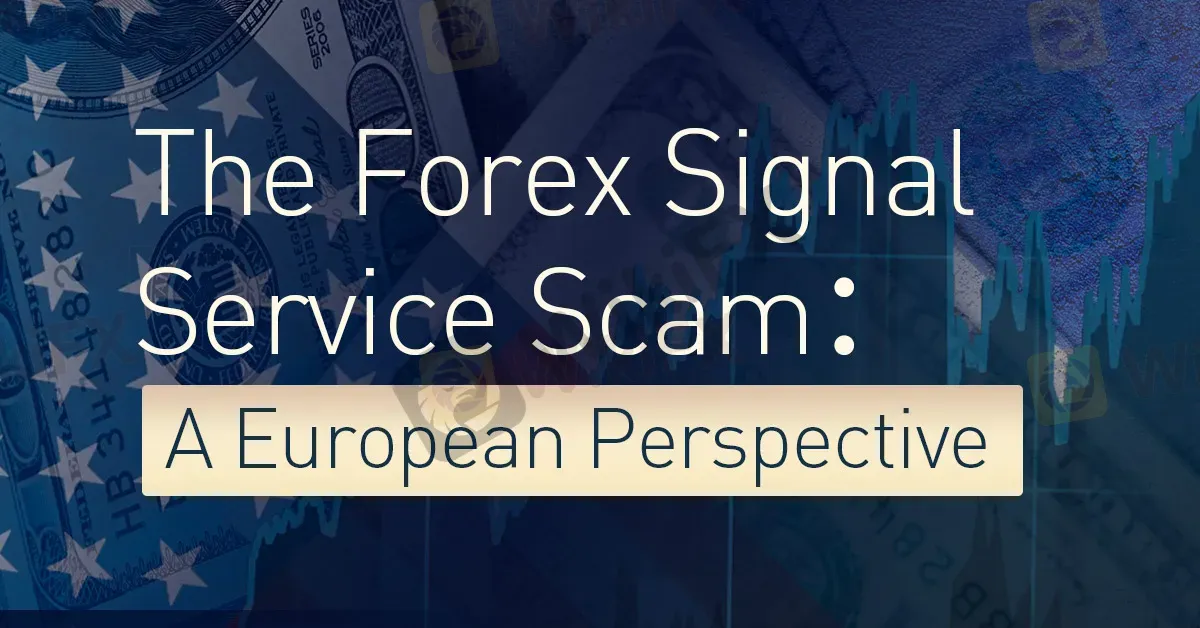简体中文
繁體中文
English
Pусский
日本語
ภาษาไทย
Tiếng Việt
Bahasa Indonesia
Español
हिन्दी
Filippiiniläinen
Français
Deutsch
Português
Türkçe
한국어
العربية
The Forex Signal Service Scam: A European Perspective
Abstract:Forex signal services promise to provide traders with expert advice and real-time signals to help them make profitable trades. While many legitimate signal services exist, Europe has witnessed its fair share of scams in this sector. In this article, we explore a prominent case and highlight the importance of resources like WikiFX in avoiding such scams.

Forex signal services promise to provide traders with expert advice and real-time signals to help them make profitable trades. While many legitimate signal services exist, Europe has witnessed its fair share of scams in this sector. In this article, we explore a prominent case and highlight the importance of resources like WikiFX in avoiding such scams.
The Forex Signal Service Scam
In Europe, a group of fraudsters operated a bogus forex signal service that claimed to offer unparalleled insights and trading recommendations. They promised subscribers a shortcut to forex success, guaranteeing substantial profits with minimal effort.
To entice traders, the scam artists boasted about their extensive experience and track record of successful trades. They even went as far as fabricating performance reports and testimonials to create an illusion of credibility. As traders subscribed to the service, they received signals that seemed promising at first glance.
However, these signals were carefully manipulated to create the appearance of profitability. Traders who followed the recommendations found themselves losing significant sums of money. It soon became evident that the forex signal service was nothing more than a cleverly designed scam.
How WikiFX Can Protect Traders
WikiFX is a vital resource for traders looking to verify the legitimacy of forex signal services and providers. The platform offers a comprehensive database of signal service providers, complete with user reviews, historical performance data, and regulatory information.
By visiting WikiFX's website (www.wikifx.com), traders can access critical information that empowers them to make informed decisions. Whether you're considering subscribing to a forex signal service or verifying the credibility of an existing one, WikiFX provides the transparency and insights needed to navigate this aspect of the forex market safely.
Conclusion
Forex signal service scams prey on traders' desire for convenience and profitability. However, with resources like WikiFX, traders in Europe and beyond can protect themselves from such scams. By conducting due diligence and verifying the legitimacy of signal service providers, traders can make informed choices and avoid falling victim to fraudulent schemes. Trust WikiFX to be your guide in the complex world of forex trading.

Disclaimer:
The views in this article only represent the author's personal views, and do not constitute investment advice on this platform. This platform does not guarantee the accuracy, completeness and timeliness of the information in the article, and will not be liable for any loss caused by the use of or reliance on the information in the article.
Read more

Mumbai Police Nabs Black Paper Dollar Conversion Forex Scam Perpetrators: Check Out the Details
The crime branch of the Mumbai Police has nabbed a racket involved in duping people by claiming to convert black paper into dollars. Check this unique 24.7-lakh scam story.

Risk Involved with Cabana Capital – Every Trader Should Know
Cabana Capital has changed its name and logo, basically everything about its identity. This seems a bit suspicious, and it's something you should definitely be concerned about. In this article, you’ll learn about the red flags that every trader needs to watch out for.

Scam Brokers Exposed! FCA Warns Traders to Stay Safe
If you are into forex trading, you need to protect your money from investment scams. Many scam brokers are active in the market now. The FCA, a reputed financial regulator, has issued a list of unlicensed brokers you need to stay away from.

LiteForex – 5 Key Things You Must Know About This Broker
LiteForex , claims that it is a safe platform to invest with. It highlights only the positive aspects of the broker. But as a trader or investor, you need to verify whether everything the broker claims is actually true?
WikiFX Broker
Latest News
XTB Hack 2025: Major Security Breach Exposes Client Accounts
These are America's 10 weakest state economies most at risk in a recession
These are America's 10 strongest state economies best prepared for a recession
Federal Reserve quietly responds to Trump administration attacks over renovation
Tariff Windfall Drives Surprise $27 Billion US Budget Surplus In June
Top Wall Street analysts are upbeat about these dividend-paying stocks
Singapore's economy grows 4.3% in second quarter, beating expectations
Global week ahead: Trade tensions cloud earnings and the G20 heads south
Singapore warns of uncertainty' after it averts a technical recession on manufacturing and construction growth
Community Pro Advice: Expert Guidance on Broker Selection
Currency Calculator


